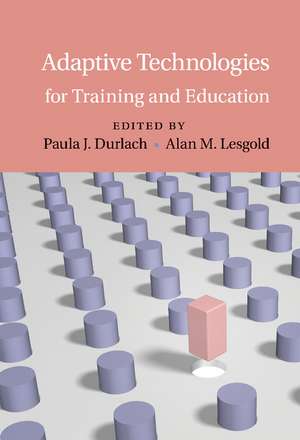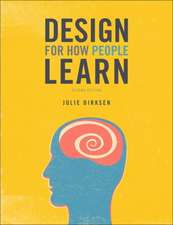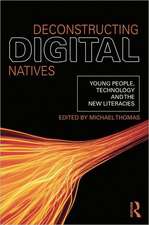Adaptive Technologies for Training and Education
Editat de Paula J. Durlach, Alan M. Lesgolden Limba Engleză Paperback – 14 oct 2015
| Toate formatele și edițiile | Preț | Express |
|---|---|---|
| Paperback (1) | 327.88 lei 6-8 săpt. | |
| Cambridge University Press – 14 oct 2015 | 327.88 lei 6-8 săpt. | |
| Hardback (1) | 853.37 lei 6-8 săpt. | |
| Cambridge University Press – 19 feb 2012 | 853.37 lei 6-8 săpt. |
Preț: 327.88 lei
Nou
Puncte Express: 492
Preț estimativ în valută:
62.74€ • 65.38$ • 51.95£
62.74€ • 65.38$ • 51.95£
Carte tipărită la comandă
Livrare economică 03-17 aprilie
Preluare comenzi: 021 569.72.76
Specificații
ISBN-13: 9781107583177
ISBN-10: 1107583179
Pagini: 380
Ilustrații: 86 b/w illus. 6 tables
Dimensiuni: 178 x 254 x 20 mm
Greutate: 0.66 kg
Editura: Cambridge University Press
Colecția Cambridge University Press
Locul publicării:New York, United States
ISBN-10: 1107583179
Pagini: 380
Ilustrații: 86 b/w illus. 6 tables
Dimensiuni: 178 x 254 x 20 mm
Greutate: 0.66 kg
Editura: Cambridge University Press
Colecția Cambridge University Press
Locul publicării:New York, United States
Cuprins
1. Adaptive educational systems Valerie Shute and Diego Zapata-Rivera; 2. Adaptive expertise as acceleration of future learning: a case study Kurt VanLehn and Min Chi; 3. Adaptive hypermedia for education and training Peter Brusilovsky; 4. Progress in assessment and tutoring of lifelong learning skills: an intelligent tutor agent that helps students become better help seekers Vincent Aleven, Ido Roll and Kenneth R. Koedinger; 5. Student modeling and intelligent tutoring beyond coached problem solving Cristina Conati; 6. Emotions during learning with autotutor Sidney D'Mello and Art Graesser; 7. Lifelong learner modelling Judy Kay and Bob Kummerfeld; 8. Training decisions from experience with decision-making games Cleotilde Gonzalez; 9. Ill-defined domains and adaptive tutoring technologies Collin Lynch, Kevin D. Ashley, Niels Pinkwart and Vincent Aleven; 10. Individualized cultural and social skills learning with virtual humans H. Chad Lane and Bob Wray; 11. Emergent assessment opportunities: a foundation for configuring adaptive training environment Phillip M. Mangos, Gwendolyn Campbell, Matthew Lineberry and Ami E. Bolton; 12. Semantic adaptive training John Flynn; 13. Speech and language processing for adaptive training Diane J. Litman; 14. The art and science of developing intercultural competence W. Lewis Johnson, LeeEllen Friedland, Aaron Watson and Eric Surface; 15. Practical issues in the deployment of new training technology Alan Lesgold; 16. A model-driven instructional strategy: the benchmarked experiential system for training (BEST) Georgiy Levchuk, Wayne Shebilske and Jared Freeman; 17. Exploring design-based research for military training environments Marie Bienkowski; 18. Conclusion Paula Durlach and Alan Lesgold.
Recenzii
"The book is invaluable, interesting, and relatively easy to read. It combines ideas we have studied for decades with applications that are emerging daily. The book is highly recommended."
G. Abramson, Computing Reviews
"Durlach and Lesgold's informative, significant, and (you read it here) highly recommended book covers adaptive instructional technologies that adjust instruction to the needs, abilities, knowlede, skills, interests, aspirations, etc of individual learners."
J.D. Fletcher, Educational Technology
"This is a very good book. It should be required reading for all of us who wished that instructional psychology could effectively use the numerous affordances provided by computers and computer science. Every chapter is worth reading since it demonstrates that the gap between the affordances provided by computers and computer science and our ability to use these in instructional contexts is narrowing."
Sigmund Tobias, Educational Research journal
G. Abramson, Computing Reviews
"Durlach and Lesgold's informative, significant, and (you read it here) highly recommended book covers adaptive instructional technologies that adjust instruction to the needs, abilities, knowlede, skills, interests, aspirations, etc of individual learners."
J.D. Fletcher, Educational Technology
"This is a very good book. It should be required reading for all of us who wished that instructional psychology could effectively use the numerous affordances provided by computers and computer science. Every chapter is worth reading since it demonstrates that the gap between the affordances provided by computers and computer science and our ability to use these in instructional contexts is narrowing."
Sigmund Tobias, Educational Research journal
Descriere
The purpose of this volume is to provide an overview of the latest advancements in computer-based training.









